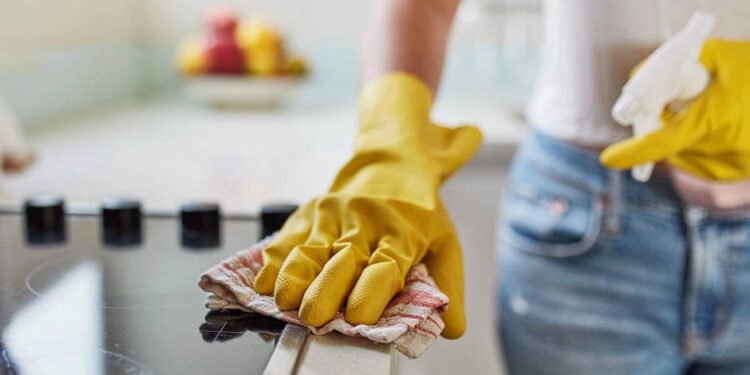Maintaining a clean and hygienic kitchen is crucial for the health and safety of your family, friends and loved ones. Due to the kitchen’s high usage and the amount of raw foods present, it’s easy for bacteria and other contaminants to spread if proper hygiene is not practised effectively.
Today, we’ll explore the importance of kitchen hygiene, the potential risks of a dirty kitchen, and provide some practical tips to keep your kitchen clean and safe all the time.
Why is Home Kitchen Hygiene Important?
Health Risks
A dirty kitchen is a breeding ground for harmful bacteria and pathogens. Some of the common illnesses caused by poor kitchen hygiene include:
- Food Poisoning: Bacteria such as Salmonella, E. coli, and Listeria can contaminate food and cause severe food borne illnesses. Symptoms often include nausea, vomiting, diarrhoea, and abdominal pain.
- Gastroenteritis: This inflammation of the stomach and intestines can be caused by viruses, bacteria, or parasites, leading to diarrhoea, cramps, nausea, and a high fever.
- Respiratory Issues: Mould and mildew, which thrive in moist, unclean environments, can cause or worsen present respiratory problems such as asthma and allergies.
Risks for Children, elderly and immunocompromised
Children, the elderly and those with a compromised immune system are most likely to be at the highest risk from the side effects of poor kitchen hygiene.
Children are particularly vulnerable, as their immune systems are still developing, making them more susceptible to infections. Similarly, elderly people have naturally weakened immune systems, while those with compromised immune systems do too.
Exposure to bacteria and toxins can lead to severe health issues in these groups of people such as:
- Dehydration: Resulting from vomiting and diarrhoea caused by food borne illnesses.
- Severe Infections: They may experience more severe symptoms and complications from infections that might be milder in other people.
Increased Fire Hazard
A dirty kitchen is not only a health risk but also a safety hazard. Grease buildup on stovetops, ovens, and exhaust fans can easily ignite, increasing the risk of kitchen fires.
Cluttered and disorganised kitchens can also obstruct exits and make it difficult to respond quickly in case of a fire.
5 Ways to Keep Your Kitchen Continually Clean and Safe
1. Clean as You Go
One of the most effective ways to maintain kitchen cleanliness is to clean as you go. Instead of letting dishes pile up or spills sit for an extended period of time, address them immediately. This habit reduces the workload and prevents the buildup of bacteria and grime.
Spills that have been left for a long period of time will also be more difficult to remove.
2. Set a Dedicated Time to Clean
If cleaning as you go seems overwhelming, set aside a dedicated time each day to clean your kitchen. A 15-20 minute routine can help maintain a spotless kitchen, whether you do it first thing in the morning or the last thing you do before you go to bed.
Make sure to focus on wiping down surfaces, washing any dirty dishes, sweeping the floor, and cleaning cooking appliances.
3. Use Disinfectants
Regularly disinfect kitchen surfaces, including counter tops, cutting boards, and sinks. Use appropriate cleaning agents that can kill bacteria and viruses.
Pay special attention to areas where raw food is prepared to prevent cross-contamination.
4. Properly Store Food
Ensure all food is stored properly to avoid spoilage and contamination. Use airtight containers for perishable items and keep your refrigerator clean and organised. Label leftovers with dates to keep track of their freshness.
You should also store water properly to avoid spills and water waste.
5. Take Out the Trash Regularly
Kitchen trash can attract pests and create unpleasant odours if it’s not managed properly. Make sure to empty the kitchen rubbish daily, and clean it regularly to prevent bacteria buildup. Use bin bags and keep the lid tightly closed.
To conclude, maintaining kitchen hygiene is essential for the health and safety of your family.
By understanding the risks associated with a dirty kitchen and implementing simple cleaning habits, you can ensure a safe and healthy environment for meal preparation and food consumption.
Adopting a proactive approach to kitchen cleanliness not only protects your family from illnesses but also reduces the risk of kitchen fires, creating a safer home overall.












